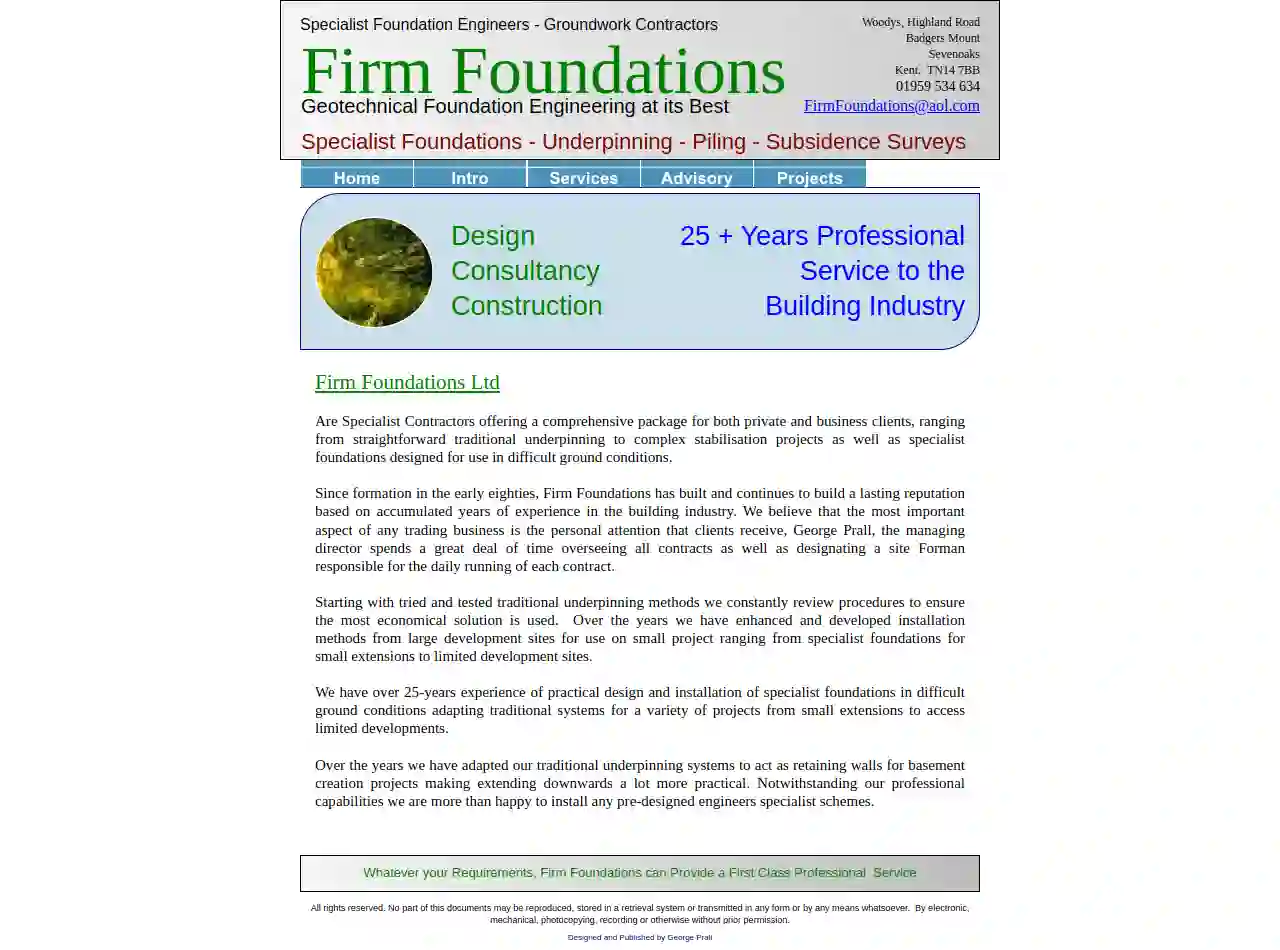Excavation Contractors Sevenoaks
Top 10 Excavation Contractors Near Me in Sevenoaks
Get up to 3 Excavation Contractors quotes for your project today! Compare profiles, reviews, accreditations, portfolio, etc... and choose the best deal.

Simon King Construction Ltd
51 reviewsSevenoaks, GBSimon King Construction Ltd is a successful firm of traditional high quality builders operating in Sevenoaks and the surrounding area. As home extension and re-modelling specialists, we bring together a wealth of experience and expertise on every size of project, united with strong customer-focused principles. Established in 1986, Simon King prides itself on delivering on its promises, a fact testified over the years by many satisfied customers. Happy to work with your own architect or we can recommend skilled local architects for you to consider. From a simple rear extension to a complete re-build, Simon King will give your project the care and attention it needs. If you are looking for expert builders in Sevenoaks, look no further, please contact Simon King for more information on how we can help extend your home or with your construction project.
- Services
- Why Us?
- Gallery
Get Quote
Firm Foundations
51 reviewsWoodys, Highland Road, Badgers Mount, TN14 7BB, GBFirm Foundations Ltd Are Specialist Contractors offering a comprehensive package for both private and business clients, ranging from straightforward traditional underpinning to complex stabilisation projects as well as specialist foundations designed for use in difficult ground conditions. Since formation in the early eighties, Firm Foundations has built and continues to build a lasting reputation based on accumulated years of experience in the building industry. We believe that the most important aspect of any trading business is the personal attention that clients receive, George Prall, the managing director spends a great deal of time overseeing all contracts as well as designating a site Forman responsible for the daily running of each contract. Starting with tried and tested traditional underpinning methods we constantly review procedures to ensure the most economical solution is used. Over the years we have enhanced and developed installation methods from large development sites for use on small project ranging from specialist foundations for small extensions to limited development sites. We have over 25-years experience of practical design and installation of specialist foundations in difficult ground conditions adapting traditional systems for a variety of projects from small extensions to access limited developments. Over the years we have adapted our traditional underpinning systems to act as retaining walls for basement creation projects making extending downwards a lot more practical. Notwithstanding our professional capabilities we are more than happy to install any pre-designed engineers specialist schemes. Whatever your Requirements, Firm Foundations can Provide a First Class Professional Service 25 + Years Professional Service to the Building Industry
- Services
- Why Us?
- Gallery
Get Quote
Over 11,537+ Excavation Pros on our directory
Our excavation contractors operate in Sevenoaks and surroundings!
ExcavationHQ has curated and vetted Top Excavation Contractors in Sevenoaks. Find the most reliable business today.
Frequently Asked Questions About Excavation Contractors
- Clearly Define the Scope: Outline the project's goals, including the excavation area, depth, grade, and intended use.
- Obtain Necessary Permits: Research and acquire any required permits from your local authorities.
- Mark Utility Lines: Contact your utility companies to locate and mark underground utilities to prevent damage.
- Communicate with Neighbors: Inform your neighbors about the project's timeline and potential noise or disruptions.
- Prepare the Site: Clear any obstacles, such as vegetation, furniture, or structures, from the excavation area.
- Discuss Safety Protocols: Review safety procedures with the contractor to ensure a safe work environment.
- Experience: Choose contractors with a proven track record and years of experience in excavation projects similar to yours.
- Licensing and Insurance: Verify that they are properly licensed to operate in your area and carry adequate insurance to protect you from liability in case of accidents or damage.
- Equipment and Resources: Ensure they have the necessary equipment and resources to handle your project efficiently and safely.
- Positive Reviews and References: Check online reviews and testimonials from previous customers. Request references and contact them to inquire about their experience with the contractor.
- Professionalism: Opt for a company that communicates clearly, provides detailed and transparent estimates, and has a responsive and courteous team.
- Clear the Area: Remove any obstacles, including vehicles, outdoor furniture, landscaping features, or structures, from the excavation zone and surrounding area.
- Mark Existing Features: Identify and mark underground utilities, septic tanks, sprinkler systems, or other buried elements you want to protect.
- Protect Landscaping: Use tarps or fencing to shield trees, shrubs, gardens, or other landscaping elements from damage.
- Provide Access: Ensure the excavation contractor has clear access to the work area, including gates wide enough for equipment.
- Discuss Logistics: Coordinate with the contractor regarding parking arrangements, material delivery, and any special instructions or concerns you might have.
- Hauling to Designated Disposal Sites: Transporting excavated material to approved landfills or recycling centers.
- Recycling or Reuse: If suitable, some excavated soil might be recycled for other projects or reused on-site for landscaping or backfilling.
- Complying with Regulations: Adhering to local and environmental regulations for soil disposal to prevent contamination or illegal dumping.
What should I do before excavation starts?
How do I find a good excavation contractor?
How do I prepare my property for excavation?
How do you handle soil disposal after excavation?
What should I do before excavation starts?
- Clearly Define the Scope: Outline the project's goals, including the excavation area, depth, grade, and intended use.
- Obtain Necessary Permits: Research and acquire any required permits from your local authorities.
- Mark Utility Lines: Contact your utility companies to locate and mark underground utilities to prevent damage.
- Communicate with Neighbors: Inform your neighbors about the project's timeline and potential noise or disruptions.
- Prepare the Site: Clear any obstacles, such as vegetation, furniture, or structures, from the excavation area.
- Discuss Safety Protocols: Review safety procedures with the contractor to ensure a safe work environment.
How do I find a good excavation contractor?
- Experience: Choose contractors with a proven track record and years of experience in excavation projects similar to yours.
- Licensing and Insurance: Verify that they are properly licensed to operate in your area and carry adequate insurance to protect you from liability in case of accidents or damage.
- Equipment and Resources: Ensure they have the necessary equipment and resources to handle your project efficiently and safely.
- Positive Reviews and References: Check online reviews and testimonials from previous customers. Request references and contact them to inquire about their experience with the contractor.
- Professionalism: Opt for a company that communicates clearly, provides detailed and transparent estimates, and has a responsive and courteous team.
How do I prepare my property for excavation?
- Clear the Area: Remove any obstacles, including vehicles, outdoor furniture, landscaping features, or structures, from the excavation zone and surrounding area.
- Mark Existing Features: Identify and mark underground utilities, septic tanks, sprinkler systems, or other buried elements you want to protect.
- Protect Landscaping: Use tarps or fencing to shield trees, shrubs, gardens, or other landscaping elements from damage.
- Provide Access: Ensure the excavation contractor has clear access to the work area, including gates wide enough for equipment.
- Discuss Logistics: Coordinate with the contractor regarding parking arrangements, material delivery, and any special instructions or concerns you might have.
How do you handle soil disposal after excavation?
- Hauling to Designated Disposal Sites: Transporting excavated material to approved landfills or recycling centers.
- Recycling or Reuse: If suitable, some excavated soil might be recycled for other projects or reused on-site for landscaping or backfilling.
- Complying with Regulations: Adhering to local and environmental regulations for soil disposal to prevent contamination or illegal dumping.